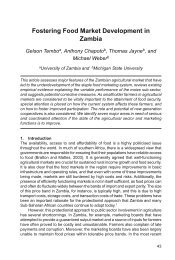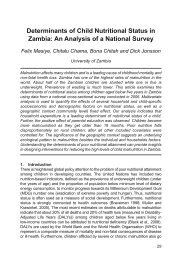Introduction to Basic Legal Citation - access-to-law home
Introduction to Basic Legal Citation - access-to-law home
Introduction to Basic Legal Citation - access-to-law home
Create successful ePaper yourself
Turn your PDF publications into a flip-book with our unique Google optimized e-Paper software.
. . . .<br />
Our decision finds support in the Department's tax regulation pertaining <strong>to</strong> property used in<br />
manufacturing. We have previously stated that the interpretation by the agency charged with<br />
administering a statute is persuasive, and that great deference should be given <strong>to</strong> that<br />
interpretation if it is within the language of the statute. See Collins Discount Liquors v. State<br />
of Nevada, 106 Nev. 766, 768, 802 P.2d 4, 5 (1990); Nevada Power Co. v. Public Serv.<br />
Comm'n, 102 Nev. 1, 4, 711 P.2d 867, 869 (1986). NAC 372.370(1) states that a tax applies <strong>to</strong><br />
the sale of tangible personal property purchased "for the purpose of use in manufacturing,<br />
producing, or processing tangible personal property and not for the purpose of physically<br />
incorporating it in<strong>to</strong> the manufactured article <strong>to</strong> be sold." Subsection (2) of that regulation<br />
states that a tax does not apply <strong>to</strong> the sale of tangible personal property purchased "for the<br />
purpose of incorporating it in<strong>to</strong> the manufactured article <strong>to</strong> be sold." NAC 372.370 focuses on<br />
the purpose for which property is purchased. The requirement that the purpose be "primary" is<br />
implicit. NAC 372.370 is therefore consistent with NRS 372.050, and sets forth a primarypurpose<br />
test.<br />
. . . .<br />
Nev. Sup. Ct. R. 123<br />
RULE 123. <strong>Citation</strong> <strong>to</strong> unpublished opinions and orders<br />
An unpublished opinion or order of the Nevada Supreme Court shall not be regarded as<br />
precedent and shall not be cited as legal authority except when the opinion or order is (1)<br />
relevant under the doctrines of <strong>law</strong> of the case, res judicata or collateral es<strong>to</strong>ppel; (2) relevant<br />
<strong>to</strong> a criminal or disciplinary proceeding because it affects the same defendant or respondent in<br />
another such proceeding; or (3) relevant <strong>to</strong> an analysis of whether recommended discipline is<br />
consistent with previous discipline orders appearing in the state bar publication.<br />
New Hampshire: Supreme Court citation practice | <strong>Citation</strong> rule(s)<br />
| < | ><br />
Examples from State v. Caswell, 146 N.H. 243, 769 A.2d 387 (2001)<br />
. . . .<br />
206<br />
Contents | Index | Help<br />
We next consider the defendant's argument that the trial court erred by admitting Sergeant<br />
Bourque's testimony <strong>to</strong> establish that the In<strong>to</strong>xilyzer was properly certified and operating<br />
properly at the time of the test. RSA 265:85 (Supp. 2000) provides that "no tests of . . . breath<br />
authorized by RSA 265:84, IV shall be considered as evidence in any proceeding before any .<br />
. . court unless such test is performed in accordance with methods prescribed by the<br />
commissioner of the department of health and human services." These rules are codified in<br />
New Hampshire Code of Administrative Rules, Part He-P 2207, and became effective April 1,<br />
1996. As a result, we review the evidence presented at trial in accordance with these rules.




